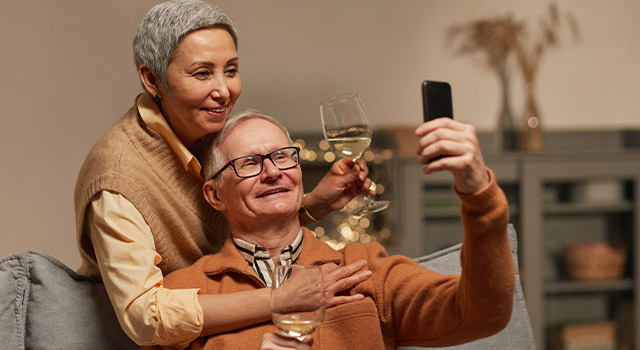 For people with low vision, the logistics of dating can sometimes feel overwhelming. Your visual needs can change the dynamics of how the date goes, where you feel comfortable going, and what you feel comfortable doing. For many, it’s enough to give up on the idea altogether. But don’t throw up your hands in frustration just yet!
For people with low vision, the logistics of dating can sometimes feel overwhelming. Your visual needs can change the dynamics of how the date goes, where you feel comfortable going, and what you feel comfortable doing. For many, it’s enough to give up on the idea altogether. But don’t throw up your hands in frustration just yet!
At Low Vision Optometry of Southern California in Corona, we want to assure you that with a little bit of planning, dating can be a great experience, even with low vision.
Here are some of our top tips on how to make it work:
1. Play an active role in setting up the date.
It’s not always easy figuring out where to go on a date. This is especially true when you have special visual considerations that factor into your options. Make sure to take an active role in choosing a place and activity you feel comfortable with.
If you’re going out to dinner, consider restaurants in your area that offer good lighting, menus in large print or braille, and which may have special experience and/or accommodations for people with vision difficulties.
If you and your date would like to enjoy a movie together, look for theaters that offer audio descriptions so that you can enjoy the movie too.
2. Pick a place you can reach by public transit or within walking distance.
It’s always best to choose a place you can get to on your own. This is especially important if you’re just meeting someone for the first time and you’re not sure how the date will go. Choosing a place that you can easily walk to or is serviced by public transportation will give you the freedom to leave when you want to.
3. Be prepared to have a conversation about your visual impairment - if you want to.
There are always conversations to be had when you’re meeting someone for the first time. The question is, when do you bring them up and how much do you say at first? Having a conversation about your visual impairment is no different.
Your low vision may have already influenced your choice of date spot and the activities you’ve planned, so don’t be surprised if your date asks questions.
Whether you want to discuss your low vision on a first date is entirely up to you. Do what feels comfortable.
4. Don’t forget about traditional places to meet people.
Your whole life shouldn’t be defined by your vision disability, and your dating life is no exception. If you enjoy reading, join a book club. Love to exercise? Join a gym or even a cycling club - tandem biking is fun. If you’re religious, attend services at your local church, synagogue, mosque. If you enjoy giving back to your community, find local opportunities to volunteer. These are great places to find like-minded people for friendship and, with a little luck, romance. Shared interests and values are a great way to build a meaningful relationship.
5. Be yourself.
In the end, the biggest advice anyone can give is the oldest in the book. Just be yourself!
Our practice serves patients from Riverside, Orange County, Temecula, and Mission Viejo, California and surrounding communities.
Frequently Asked Questions with Dr. Richard Shuldiner
Q: What is low vision?
Low vision is defined as fully corrected vision (with glasses/contacts/surgery) that is still insufficient to do what you want to do.
There are many causes of low vision, including glaucoma, cataracts and macular degeneration, stroke and eye injuries. Patients with these conditions need two eye doctors. The medical eye doctor treats the medical condition. Low vision optometrists prescribe low vision glasses and aids to help with the vision loss condition. Low vision aids, such as telescope and microscope glasses, E-Scoop glasses, prism glasses and magnifiers make the most of the remaining vision and help maintain independence and quality of life.
Q: What is a low vision exam?
A: A low vision exam evaluates your level of vision, as well as the tasks you wish to do and can no longer engage in due to your limited vision. The low vision exam goes above and beyond the usual comprehensive eye exam performed by your eye doctor and concentrates on your visual needs.
Your eye doctor will ask you questions about your family history, your eye health and your general health. You’ll also be asked if you have difficulty with vision for daily tasks such as driving, reading or pouring yourself a cup of coffee.
All of this information will allow your eye doctor to accurately assess your level of vision loss and how it is affecting your daily life. With this information, they will be able to advise you on the proper steps you can take, and low vision glasses and aids you can use to maintain your independence and make the most of your remaining vision.
